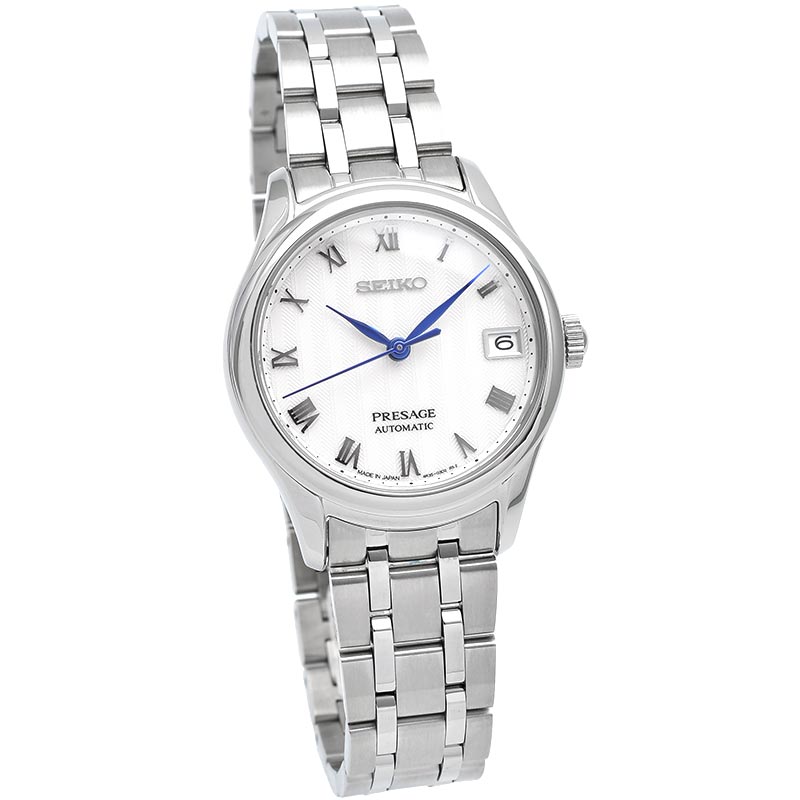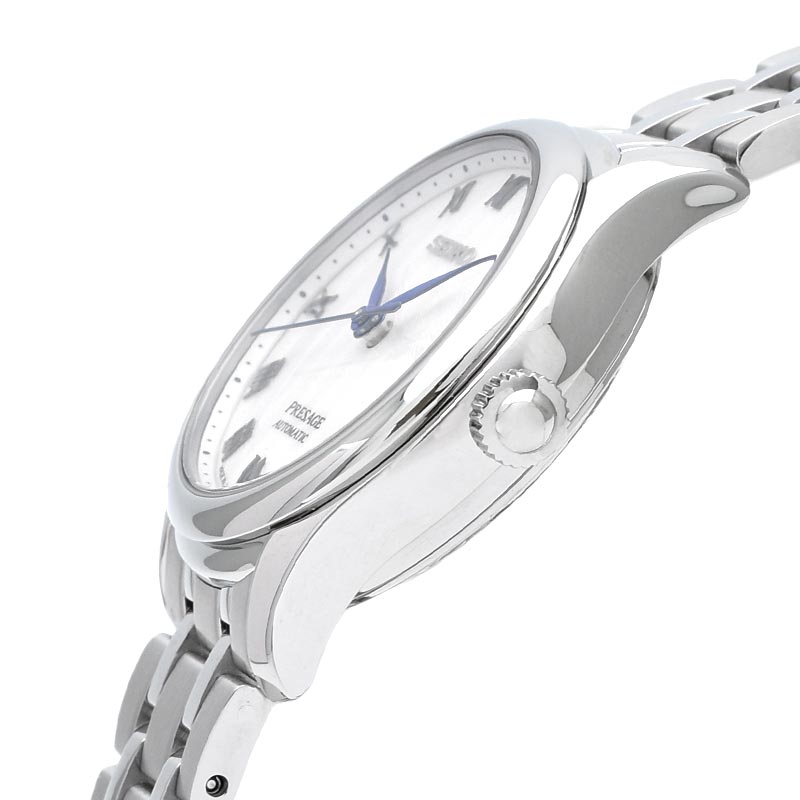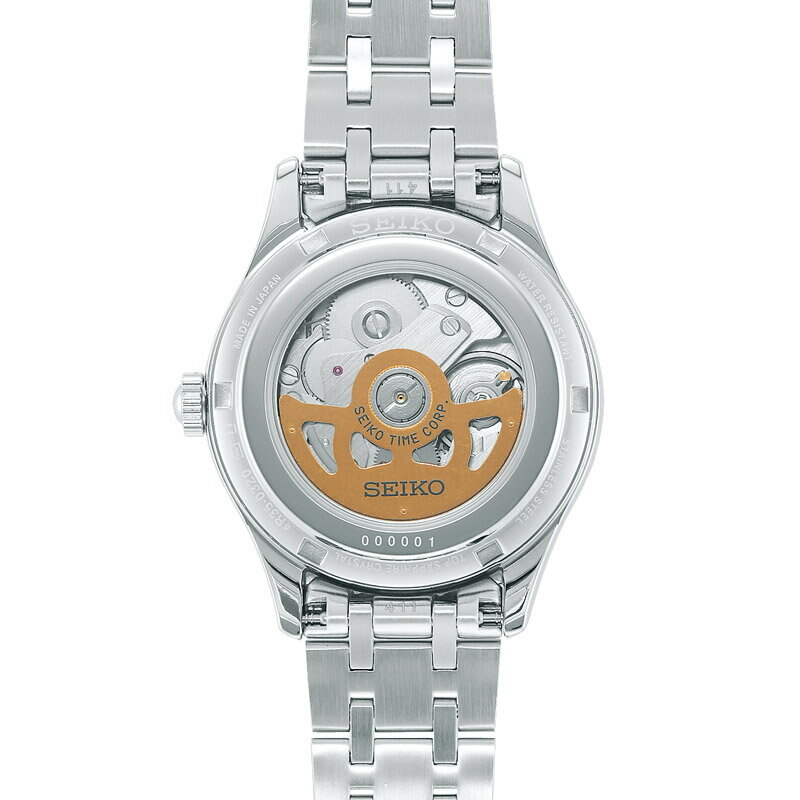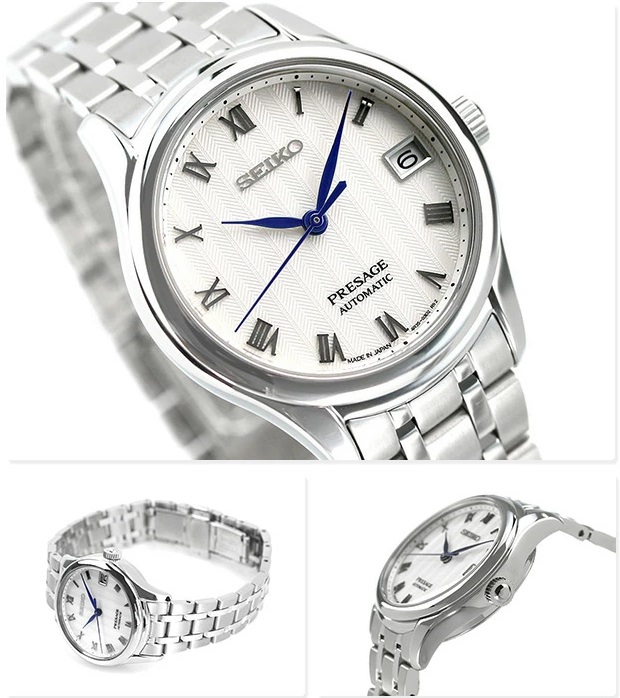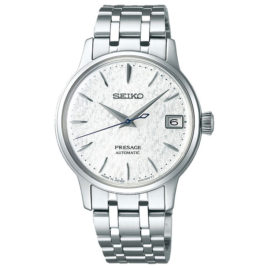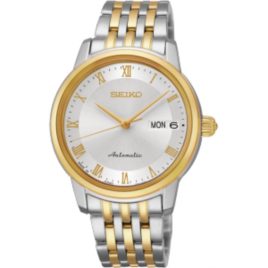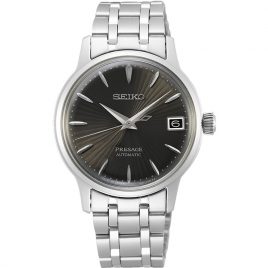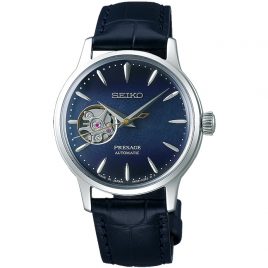Description
SEIKO Presage SRPF49J1 Specifications :
| Feature |
| |||
|---|---|---|---|---|
| Driving system | Automatic with manual winding mechanism | |||
| Caliber Number | 4R35 | |||
| Case material | Stainless steel | |||
| Case back | Screw see-through case back | |||
| Case color | Silver tone | |||
| Glass material | Dual-curved sapphire crystal | |||
| Band type | Bracelet | |||
| Band material | Stainless steel | |||
| Band color | Silver tone | |||
| Band width | 17 mm | |||
| Clasp | Deployment with push button release | |||
| Dial color | White | |||
| Dial markers | Black colored tone roman numerals | |||
| Hands color | Blue colored tone (hour, minute, second) | |||
| Bezel | Fixed silver tone stainless steel | |||
| Crown | Pull out at 3 o’clock position | |||
| Calendar | Date display at 3 o’clock position | |||
| Function | Date, hour, minute, second, stop second hand | |||
| Drive duration | Power reserve approximately 41 hours | |||
| Accuracy | +45 to -35 seconds per day | |||
| Water resistance | Splash / water resistance for everyday life | |||
| Magnetic reluctance | Magnetic resistance 4,800 A/m | |||
| Vibrations | 21,600 vibrations per hour (6 beats per second) | |||
| Size | Length 41.2 mm x Diameter 34.3 mm x Thickness 11 mm | |||
| The perimeter of bracelet | 205 mm | |||
| Weight | 99 g |
SEIKO Presage SRPF49J1 Features :
- See-through case back
- Screw case back
- 23 jewels
- Date display
- Stop second hand function
SEIKO Presage SRPF49J1 History :
Presage. The product of a century and more of experience
In 1913, Seiko made its first mechanical watch. 1956, Seiko made its first automatic watch. 1958 Seiko created its shock resistant system, Diashock, to preserve precision when the movement is subject to impact. 1959, Seiko invented the Magic Lever spring winding mechanism, and in 1964, it started producing balance springs in-house, utilizing its own specially developed alloy, Spron. 1967, Seiko created Japan’s first hi-beat caliber. 1969, Seiko made the world’s first automatic chronograph with vertical clutch and column wheel systems and in 2014 Seiko’s mechanical watchmaking skills were rewarded with a prize at the Grand Prix d’Horlogerie de Genève for its hi-beat caliber.
For over a century, Seiko has developed and refined its mechanical watchmaking skills. Today, all this experience comes together in a new, all-mechanical, collection named Presage. Presage has already been successful in Japan and selected other markets for some time. Now Presage goes global and takes center stage as Seiko’s leading mechanical watch collection.
Presage: A wide range of calibers, designs and tastes
Presage is a collection of broad appeal. It comprises 60 models and uses the full range of Seiko’s mechanical calibers, from the accessible 4R, through 6R to the exclusive 8R. Highlights include the 6R27 multi-hand power reserve model and a series using an entirely new version of the 4R57 caliber. This new caliber is Seiko’s first ever with a center power reserve indicator, and is available in a series of five designs, including a limited edition. Every Presage watch has 10 bar water resistance and a sapphire crystal.
Japan is a land with a long and unbroken cultural history and therefore values tradition very highly. Long-lasting beauty and long-lasting performance express the deep desires of Japanese culture and are therefore at the heart of Japanese craftsmanship. Both in design and manufacturing values, Presage belongs firmly in this tradition and offers the very highest levels of reliability and durability over time. Each Presage watch is built to last for generations.
SEIKO Presage SRPF49J1 Story :

The Zen Garden
With Subtraction, The Beauty is Added
It is the essence of aesthetic minimalism: addition through subtraction. The Zen Garden, also known as the Japanese Rock Garden or Dry Landscape, embraces the principles of Japanese aestheticism. The Karesansui style, for instance, uses only rocks and sand. Patterns are made in the sand to depict ripples and waves. This stems from a belief that the essence of water can be expressed more vividly through its absence. Closely associated with Zen Buddhism, many of the most famous Japanese rock gardens can be found in temples. In this serene setting, nature is simple and beauty is timeless.
Only in Japan
Wabi Sabi
The Zen Garden is often associated with the difficult-to-translate Japanese term, wabi-sabi, which refers to the beauty of imperfection. Wabi-sabi celebrates the flawed, the impermanent, the rustic and the melancholy. In the case of the Zen Garden, it reminds us that beauty is found in the absence of materials, rather than in their abundance; in transient states rather than permanent ones. To many, however, wabi-sabi is not merely an aesthetic code; it is a philosophical characterization of life itself.
The Ripples of Time
Water-inspired ripples of the Zen Garden enhance the tranquil dial face of the Seiko Presage—available in harmonious white and peaceful black. Simple yet sublime, these dials create a graceful reminder that less is more. And that true beauty is timeless.



